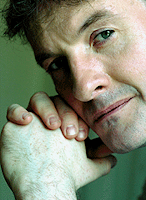 … they first make mad. The publishing industry can be a cruel one, folks. A few years back, I was talking on the phone with the publisher of EIGHTBALL BOOGIE, and he casually mentioned that the book was about to be published in Russia. “Criminy!” says I. “I’ll send you over a few copies,” says he. He sent one. It wasn’t EIGHTBALL BOOGIE. Had he put the wrong book in the post? No, he’d just confused it with another book he was publishing. An easy enough mistake to make, given that the title of the novel, OVERNIGHT TO INNSBRUCK, was rendered in Cyrillic – although the author’s name, Denyse Woods, wasn’t.
… they first make mad. The publishing industry can be a cruel one, folks. A few years back, I was talking on the phone with the publisher of EIGHTBALL BOOGIE, and he casually mentioned that the book was about to be published in Russia. “Criminy!” says I. “I’ll send you over a few copies,” says he. He sent one. It wasn’t EIGHTBALL BOOGIE. Had he put the wrong book in the post? No, he’d just confused it with another book he was publishing. An easy enough mistake to make, given that the title of the novel, OVERNIGHT TO INNSBRUCK, was rendered in Cyrillic – although the author’s name, Denyse Woods, wasn’t. Such moments teach us humility, if little else. I hope Denyse Woods sold a million copies in Russia …
Anyway, as all three regular readers of CAP will be aware, Houghton Mifflin Harcourt late last year declined to publish the sequel to THE BIG O. Which was a bummer, especially as the deal was a two-book and HMH had specifically asked for a sequel. It must have been a close-run decision, though, because it seems as if someone in there had at some point seriously committed to the book, to the extent that it got an Amazon slot (as ‘Untitled Crime Novel’ by Declan Burke), and an ISBN number. Well, it’s that or the ‘Untitled Crime Novel’ was actually intended to be the paperback version of THE BIG O – although, in that case, they’d simply call it THE BIG O (pb), wouldn’t they?
Either way, knowing how close the sequel, aka CRIME ALWAYS PAYS, came to being published is heartbreaking, because what its not being published by HMH means is that no one else will touch it with a barge-pole, especially as it’s a sequel. This despite the fact that, in my not-entirely-humble opinion at least, CRIME ALWAYS PAYS is a superior read to THE BIG O, being faster, funnier and slightly shorter, and being set for a goodly bit in the Greek islands, which is always a bonus. All of which matters not the proverbial whit – the book, poor unwanted orphan that it is, will only ever see the light of day if I decide to self-publish. Which I might well do, just for giggles …
But back to ‘Untitled Crime Novel’ by Declan Burke. It’s cruel enough that it’s sitting out there in cyberspace, mocking me, but here’s the kicker – right now, at the time of writing, THE BIG O’s sales rank on Amazon.com is 858,436. Meanwhile, the phantom ‘Untitled Crime Novel’ by Declan Burke has a sales rank of 320,829.
Sometimes, if you didn’t laugh, you’d have to cry …
































